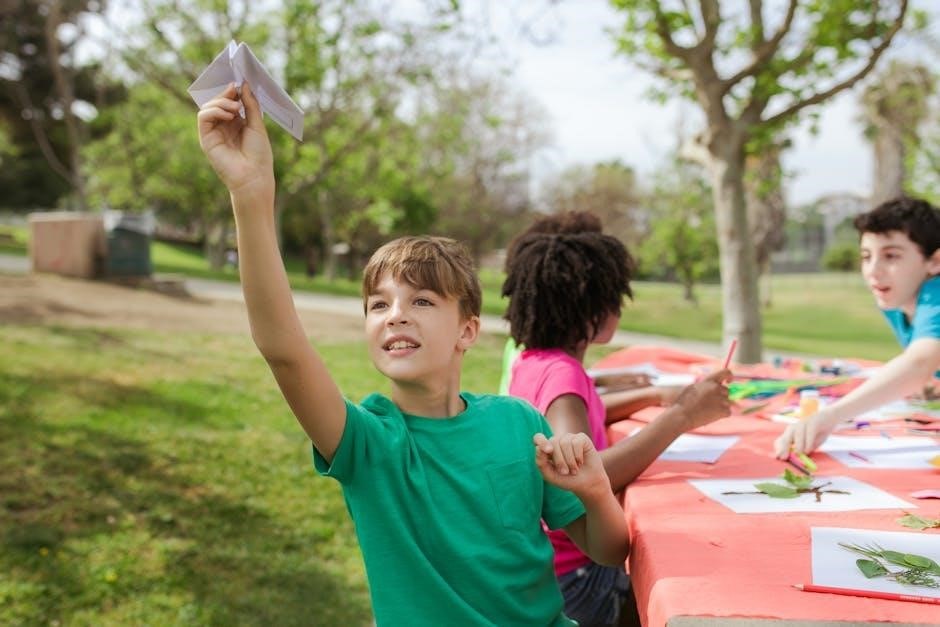
Recovery games for groups offer a transformative approach to healing, fostering connection and engagement among participants. These activities create a structured, supportive environment for shared growth and empowerment.
Understanding the Importance of Group Activities in Recovery
Group activities play a vital role in the recovery process by fostering a sense of community and connection among participants. Sharing experiences and feedback in a supportive environment empowers individuals to confront challenges collectively. These activities reduce feelings of isolation and stigma, creating a space where individuals feel understood and valued. Group settings also encourage accountability and motivation, as participants learn from others’ journeys and strategies. By engaging in shared goals and collaborative efforts, individuals build resilience and develop essential coping skills. This collective approach not only enhances personal growth but also strengthens the overall recovery process, making it a cornerstone of effective rehabilitation.
The Role of Games in Promoting Healing and Connection
Games play a pivotal role in fostering healing and connection within recovery groups by creating engaging, interactive experiences. They provide a safe space for individuals to express emotions, share experiences, and build trust with others. Through structured activities, games encourage active participation, helping participants bond over common challenges and successes. This collaborative environment strengthens interpersonal relationships and reduces feelings of isolation. Games also make complex recovery concepts more accessible and relatable, allowing individuals to process their experiences in a non-threatening manner. By promoting laughter, collaboration, and mutual support, games become a powerful tool for emotional healing and fostering a sense of community in recovery settings.
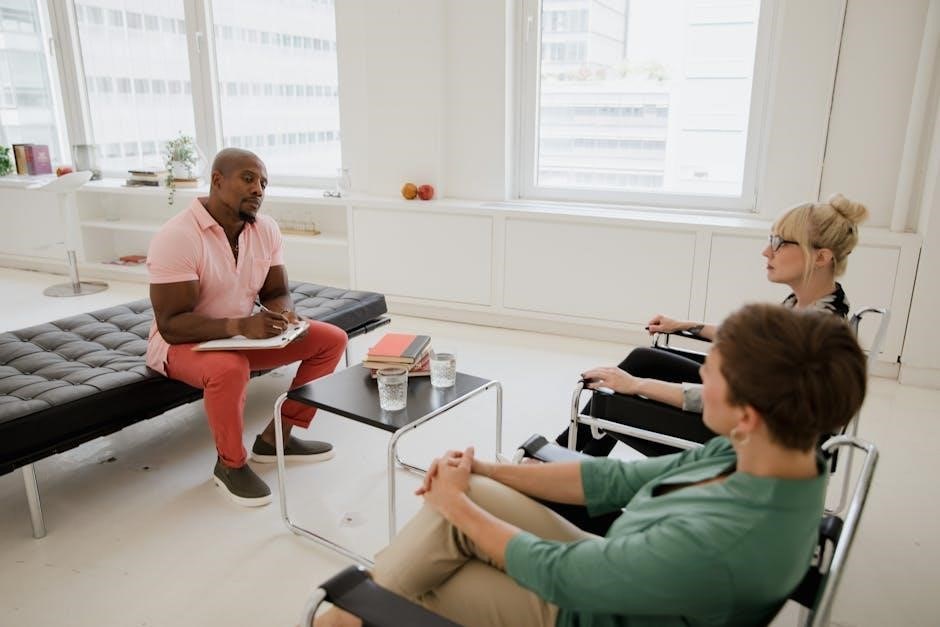
Benefits of Group Therapy in Recovery
Group therapy fosters connection, reduces isolation, and provides a supportive environment for shared experiences. It is as effective as individual treatment, encouraging inspiration and accountability among participants.
How Group Therapy Reduces Isolation
Group therapy is a powerful tool for reducing isolation by creating a shared space where individuals connect over common experiences. Participants feel less alone as they bond with others facing similar challenges, fostering empathy and understanding; This collective support system helps rebuild confidence and encourages personal growth. By sharing stories and struggles, individuals gain inspiration and motivation from one another, strengthening their resilience. The sense of belonging and connection in group therapy combats loneliness, making the recovery journey feel less daunting. This shared experience becomes a foundation for healing, proving that no one has to face recovery alone.
Effectiveness of Group Therapy Compared to Individual Treatment
Group therapy is often as effective as individual treatment for substance use disorders, offering a dynamic environment for healing. It provides diverse perspectives and mutual support, enhancing learning and growth. Participants benefit from shared experiences, reducing feelings of isolation and fostering connection. Group activities, such as role-play and games, encourage engagement and practical skill-building. Research, including findings from the Substance Abuse and Mental Health Services Administration, highlights the effectiveness of group therapy in promoting long-term recovery. This collaborative approach not only addresses individual needs but also creates a sense of community, making it a valuable complement or alternative to one-on-one treatment.
Support Groups and Their Impact on Recovery
Support groups play a vital role in the recovery process, offering a safe space for individuals to share experiences and receive encouragement. These groups reduce isolation by connecting participants with others who face similar challenges. Through shared stories and collective support, members gain inspiration and develop coping strategies. Research indicates that active participation in support groups, such as Alcoholics Anonymous, significantly improves recovery outcomes. Group activities, including games and role-play, further enhance engagement and personal growth. The sense of belonging and accountability fostered by these groups empowers individuals to maintain their commitment to recovery, making support groups an indispensable component of holistic treatment plans.
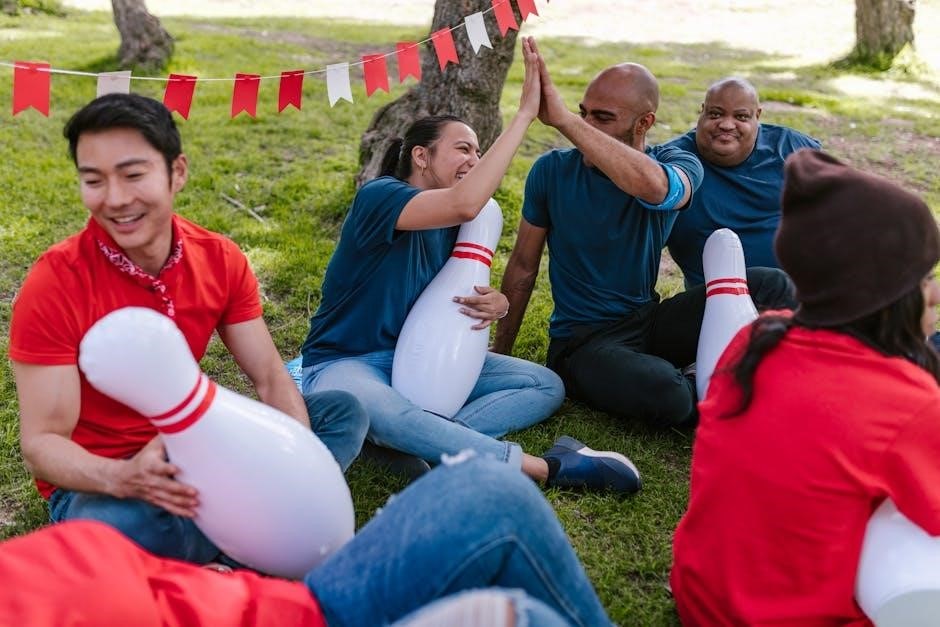
Types of Recovery Games for Groups
Recovery games include Jeopardy-style quizzes, role-play scenarios, and interactive activities designed to educate, engage, and promote personal growth among participants in a supportive group setting.
Jeopardy Games for Substance Use and Mental Health Recovery
Jeopardy-style games are a popular and engaging tool in group recovery settings, offering an interactive way to educate participants about substance use and mental health topics. These games are designed to be both fun and informative, covering key areas such as relapse prevention, coping strategies, and emotional regulation. They often include questions tailored to various levels of recovery experience, making them adaptable for diverse groups. Participants can compete individually or in teams, fostering collaboration and camaraderie. Many Jeopardy games are available as downloadable PDFs or online via platforms like JeopardyLabs, providing accessible resources for facilitators. This format encourages active participation, helping individuals retain information and apply it to their recovery journey.
Role-Play Scenarios in Recovery Coaching
Role-play scenarios are a dynamic tool in recovery coaching, enabling participants to practice real-life situations in a safe and controlled environment. These scenarios often focus on challenges such as setting boundaries, communicating effectively, or handling triggers. By acting out potential encounters, individuals gain confidence and develop practical skills for navigating difficult conversations or decisions. Role-plays are typically structured with clear goals, allowing participants to explore emotions and responses without fear of judgment. This interactive approach fosters empathy, self-awareness, and problem-solving abilities, making it an invaluable component of group recovery activities. Coaches guide the process, ensuring a constructive and supportive experience for all involved.
Interactive Activities for Personal Growth and Coping
Interactive activities for personal growth and coping are designed to engage participants in meaningful ways, fostering emotional exploration and skill development. These activities often include icebreakers, problem-solving exercises, and creative tasks that encourage collaboration and self-reflection. By actively involving individuals, these exercises help build resilience, improve communication, and enhance interpersonal connections. They also provide a platform for participants to explore their values, identify triggers, and practice healthy coping mechanisms. Such activities are tailored to promote a sense of accomplishment and empowerment, making them a vital part of group recovery programs. They create a dynamic and supportive environment for sustainable personal development.
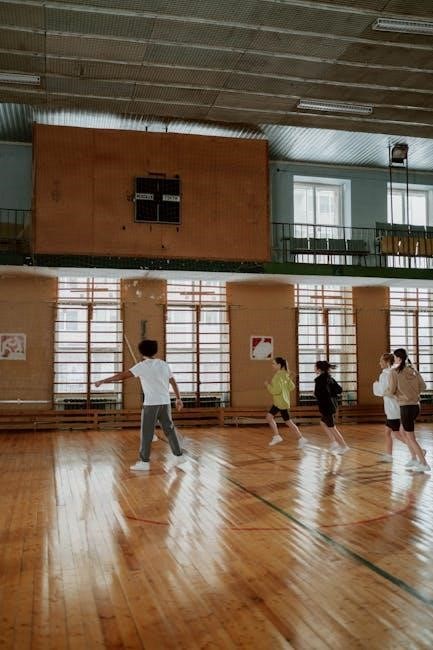
Designing Recovery Games for Groups
Designing recovery games involves creating engaging, structured activities that promote healing and connection. These games should be adaptable to diverse groups and incorporate printable or digital resources effectively.
Creating Engaging and Structured Activities
Creating engaging and structured activities is key to fostering participation and growth in recovery games. These activities should have clear objectives, such as promoting teamwork, emotional expression, or skill-building. Incorporating interactive elements like puzzles, quizzes, or role-playing ensures variety and keeps participants invested. Structured games provide a sense of safety and predictability, which is especially important for individuals in recovery. Activities should also be adaptable to different group dynamics and age levels, ensuring inclusivity and relevance. By combining creativity with purposeful design, these games can effectively support personal growth, healing, and connection among participants. Printable and digital resources can further enhance engagement and accessibility.
Incorporating Printable and Digital Resources
Incorporating printable and digital resources enhances the effectiveness of recovery games for groups. PDF workbooks, activity guides, and Jeopardy-style games provide structured tools for facilitators to engage participants. Digital platforms like Jeopardy Labs offer interactive and adaptable games, catering to diverse group needs. Printable resources ensure accessibility for those without consistent internet access. These materials often include exercises for personal reflection, coping strategies, and group discussions, fostering deeper engagement. By combining physical and digital elements, facilitators can create dynamic and inclusive activities that support healing and connection. These resources also allow for easy customization, ensuring that games remain relevant and impactful for various recovery stages and group dynamics.
Adapting Games for Different Age Groups
Adapting recovery games for different age groups ensures inclusivity and effectiveness. For younger participants, simpler, visually engaging activities like puzzles or matching games can be used. Teenagers may benefit from interactive or competitive games aligned with their interests, such as video game-based exercises. Adults can engage in more complex discussions or role-play scenarios tailored to their life experiences. By adjusting the complexity and themes of games, facilitators can cater to diverse needs while maintaining the core focus on recovery. This approach fosters a supportive environment where individuals of all ages can participate meaningfully, enhancing their engagement and growth in the recovery process.
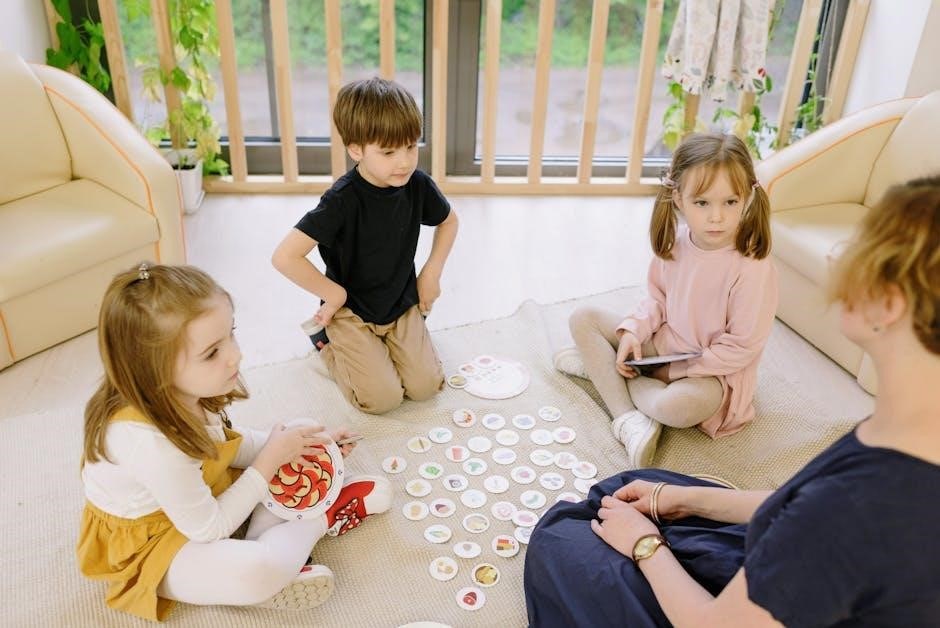
The Role of Facilitators in Recovery Games
Facilitators play a crucial role in guiding recovery games, ensuring activities are engaging and purposeful. They foster participation, provide support, and maintain a positive, structured environment for growth.
Guidelines for Conducting Effective Group Sessions
Facilitating recovery group sessions requires a structured approach to ensure effectiveness. Start by creating a safe, inclusive environment where participants feel comfortable sharing. Encourage active listening and empathy among members. Set clear expectations and boundaries to maintain focus and respect. Use engaging activities like role-play or games to promote interaction and learning. Be adaptable to the group’s needs, adjusting activities as necessary. Ensure equal participation by encouraging quieter members and managing dominant ones. Provide constructive feedback and celebrate progress to build confidence. Maintain confidentiality and cultural sensitivity to create a supportive space for all. Regularly assess the group’s dynamics to ensure goals are being met. Consistency and patience are key to fostering long-term growth and connection.
Encouraging Participation and Engagement
Encouraging participation in recovery group sessions is vital for fostering engagement and growth. Facilitators should create a safe, inclusive environment where everyone feels valued and comfortable contributing. Using interactive games and activities tailored to the group’s needs can boost involvement and make sessions more enjoyable. Positive reinforcement, such as acknowledging contributions, helps build confidence and motivates participants to share. Facilitators should encourage quieter members to speak while managing dominant voices to ensure balanced interaction. Celebrating progress and milestones further enhances engagement and fosters a sense of community. By adapting activities to the group’s preferences and energy, facilitators can maximize participation and create a dynamic, supportive space for healing and connection.
Handling Difficult Situations in Group Therapy
Handling difficult situations in group therapy requires skill and sensitivity to maintain a positive environment. Facilitators should remain calm and neutral, addressing conflicts or emotional outbursts promptly. Setting clear boundaries and encouraging respectful communication helps prevent escalation. If a participant becomes disruptive, redirecting the conversation or taking a brief pause can refocus the group. Facilitators should validate emotions while guiding discussions toward constructive outcomes. Involving the group in problem-solving fosters a sense of unity and shared responsibility. By addressing challenges thoughtfully, facilitators can turn difficult moments into opportunities for growth and deeper connection, ensuring the session remains productive and supportive for all participants.
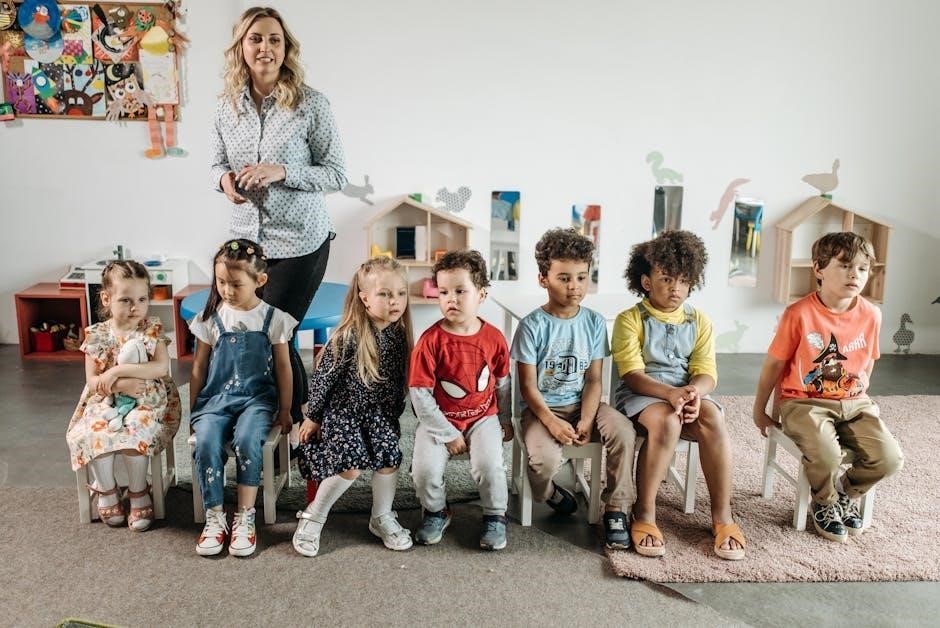
Healing Through Playful Activities
Playful activities in recovery foster emotional growth, helping participants explore core values and beliefs while creating a safe space for connection and shared healing experiences.
How Games Foster Emotional and Interpersonal Growth
Recovery games are powerful tools for fostering emotional and interpersonal growth by encouraging open communication and empathy. They provide a structured yet engaging environment where participants can express emotions, build trust, and develop healthy relationships. These activities help individuals connect on a deeper level, breaking down walls of stigma and shame. Through teamwork and shared experiences, games promote mutual understanding and camaraderie, empowering individuals to support one another in their recovery journey. This collaborative approach not only strengthens interpersonal bonds but also enhances self-awareness and resilience, making it easier for participants to navigate life’s challenges with confidence and hope.
Using Games to Explore Core Values and Beliefs
Games provide an engaging platform for individuals to explore and identify their core values and beliefs, fostering self-reflection and personal growth. Structured activities encourage participants to examine their principles, goals, and motivations, helping them align actions with their values. These exercises often involve role-play or scenario-based challenges, allowing individuals to express their beliefs in a safe, supportive environment. By sharing insights and receiving feedback, participants gain clarity and confidence in their personal values, which are essential for long-term recovery and resilience. This process strengthens their sense of purpose and direction, making it easier to navigate life’s challenges with integrity and authenticity.
Building a Supportive Environment for Sharing
Creating a supportive environment for sharing is crucial for fostering trust and connection among group members. Group therapy activities are designed to encourage open communication, empathy, and understanding, helping participants feel safe to express their thoughts and emotions. By promoting active listening and nonjudgmental interactions, facilitators can cultivate a space where individuals feel valued and supported. This environment not only strengthens interpersonal bonds but also empowers participants to share their experiences and insights freely. As trust grows, the group dynamically evolves, allowing for deeper levels of vulnerability and connection, which are essential for meaningful sharing and collective growth in the recovery journey.

DOWNLOADABLE RESOURCES FOR RECOVERY GAMES
Access free PDF workbooks, Jeopardy Labs, and printable activities designed to enhance group therapy sessions and promote engagement in recovery journeys.
Free PDF Workbooks and Activity Guides
Free PDF workbooks and activity guides are invaluable tools for facilitating group recovery sessions. Designed to promote engagement and personal growth, these resources include exercises, icebreakers, and reflective activities tailored for group settings. Many workbooks incorporate clinically-relevant content, blending fun with structured learning to enhance treatment retention and reduce relapse rates. Activities often focus on exploring core values, coping strategies, and emotional intelligence, making them ideal for substance use and mental health recovery. These downloadable guides are easily accessible and adaptable, offering a versatile way to support participants’ journeys. They provide a comprehensive framework for fostering connection and empowerment in recovery groups.
Jeopardy Labs for Recovery-Oriented Games
Jeopardy Labs offers a dynamic platform for creating recovery-oriented games tailored to substance use and mental health recovery. These interactive activities are designed to engage groups, fostering learning and connection. With a focus on dual recovery topics, these games are ideal for participants with some recovery experience. They can be accessed online or downloaded as PDFs, providing flexibility for facilitators. Jeopardy Labs allows easy customization, enabling adaptation to various group needs and age ranges. This tool enhances group therapy by making complex topics approachable and fun, while promoting exploration of core values and coping strategies. It’s a valuable resource for structured, engaging recovery sessions.
Comprehensive Lists of Printable Recovery Activities
Comprehensive lists of printable recovery activities provide a wide range of engaging and structured exercises for group therapy. These resources are designed to promote healing, coping, and personal growth, making them ideal for individuals of all ages. From worksheets to interactive games, these activities are easily accessible and adaptable to diverse group dynamics. They offer a fun and creative way to explore core values, emotional struggles, and interpersonal conflicts. Printable formats ensure convenience, allowing facilitators to prepare materials in advance. These activities not only foster connection but also empower participants to celebrate progress and milestones in their recovery journey. They are a valuable tool for long-term engagement and growth.

Case Studies and Success Stories
Participants in recovery games often share inspiring stories of overcoming challenges and achieving milestones, demonstrating the effectiveness of group activities in fostering lasting change and growth.
Real-World Applications of Recovery Games
Recovery games are widely used in treatment centers and support groups to address substance use and mental health challenges. For example, Jeopardy-style games educate participants on relapse prevention strategies, while role-play scenarios simulate real-life challenges, fostering practical coping skills. These activities encourage open dialogue, reduce stigma, and promote teamwork. Many facilitators report improved engagement and emotional growth among participants. Additionally, printable resources like worksheets and activity guides are often distributed to reinforce learning. Real-world applications highlight how these games create a dynamic, interactive environment that complements traditional therapy methods, making recovery more accessible and impactful for diverse populations. Their effectiveness is evident in the positive outcomes shared by both facilitators and participants.
Testimonials from Participants and Facilitators
Participants and facilitators alike have praised recovery games for their engaging and impactful nature. Many participants have shared that these activities helped them feel more connected to their peers, fostering a sense of community and reducing feelings of isolation. Facilitators often highlight how games encourage active participation and make complex recovery concepts more accessible. One participant noted, “The games made recovery feel less like work and more like a shared journey.” Another facilitator added, “Seeing individuals open up and engage in ways they never had before has been incredibly rewarding.” These testimonials underscore the transformative power of recovery games in creating a supportive and dynamic environment for healing.
Measuring the Impact of Group Games on Recovery
Evaluating the effectiveness of recovery games involves tracking participation levels, emotional engagement, and behavioral changes. Many facilitators report increased openness and collaboration among participants, with games breaking down barriers and fostering deeper connections. Metrics such as improved attendance rates and reduced relapse incidents further highlight their value. Anonymous feedback from participants often reveals heightened confidence and a stronger sense of community. Additionally, observable improvements in problem-solving skills and emotional regulation demonstrate the profound impact of these activities. By incorporating tools like Jeopardy-style games, facilitators can create measurable, long-term benefits for individuals in recovery, making these activities a cornerstone of modern therapeutic approaches.
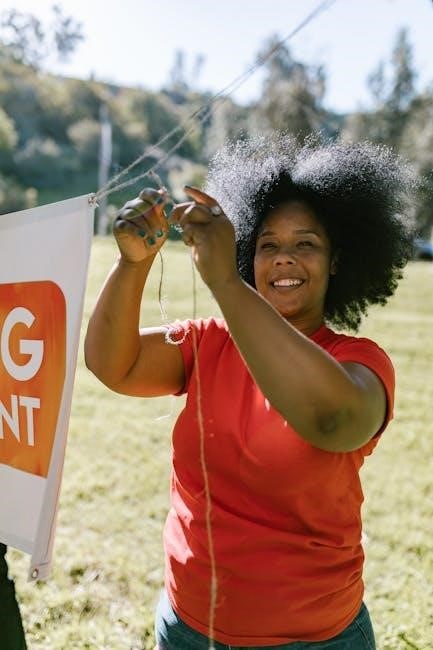
Long-Term Engagement and Growth
Recovery games foster sustained participation and personal development, helping individuals stay committed to their journey while celebrating progress and integrating fun, meaningful activities into their long-term plans.
Encouraging Continuous Participation in Group Activities
Engaging participants consistently in recovery games requires a supportive and inclusive environment. Positive reinforcement, such as celebrating milestones, helps build motivation. Incorporating diverse, interactive activities ensures the content stays fresh and relevant. Providing achievable goals and fostering a sense of accomplishment keeps individuals invested. Encouraging peer support and teamwork strengthens bonds, making participation feel less like a chore and more like a shared journey. Regular feedback and adaptability to group needs also enhance engagement. By maintaining a balance between structure and flexibility, facilitators can create a space where individuals feel valued and motivated to continue their active involvement in group recovery efforts.
Using Games to Celebrate Progress and Milestones
Recovery games are powerful tools for celebrating progress and milestones, fostering motivation and camaraderie. Incorporating rewards or recognition within games acknowledges achievements and reinforces positive behavior. Interactive activities, such as Jeopardy! or role-play scenarios, provide structured yet engaging ways to mark personal growth. Celebrating milestones through play creates a supportive environment where individuals feel valued and encouraged. This approach not only strengthens the group dynamic but also reinforces the importance of perseverance. By integrating celebration into the recovery process, games help participants stay motivated and inspired, turning progress into a shared and joyful experience that enhances overall well-being.
Integrating Recovery Games into Long-Term Treatment Plans
Recovery games are valuable tools for long-term treatment plans, offering consistent engagement and motivation. Incorporating structured activities ensures sustained participation and progress tracking. Games adapt to evolving needs, providing fresh challenges and fostering growth. Regular use of recovery games strengthens group dynamics and reinforces therapeutic goals. They also provide a sense of achievement and continuity, helping individuals stay committed to their recovery journey. By integrating games into treatment plans, facilitators create a balanced and engaging approach that supports lasting change and personal development. This holistic method ensures that recovery remains dynamic, inspiring, and effective over time.
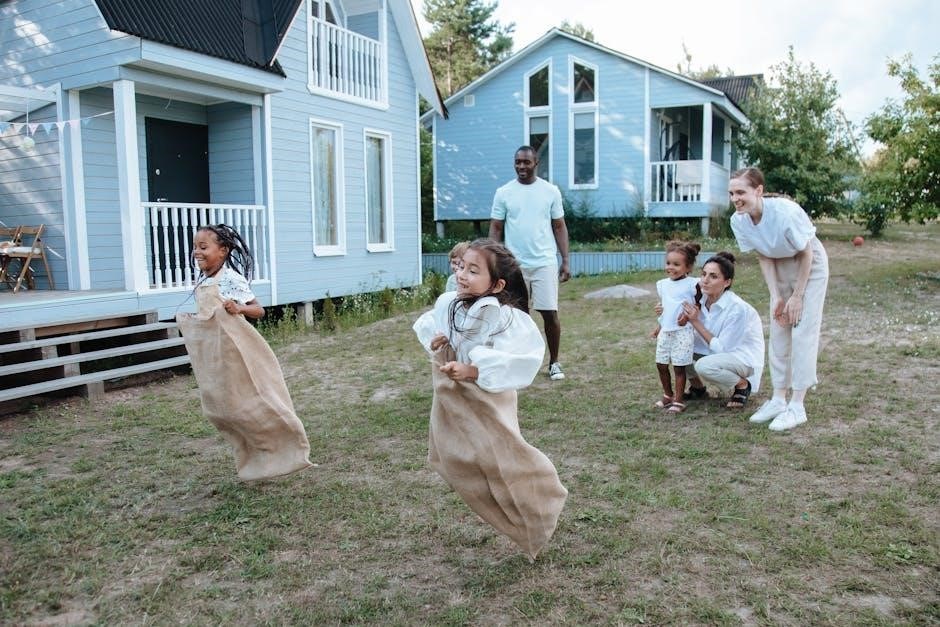
Cultural and Individual Considerations
Cultural and individual considerations are crucial for effective recovery games. Adapting activities to diverse backgrounds ensures inclusivity and respect, fostering a supportive environment for all participants.
Adapting Games for Diverse Group Dynamics
Adapting recovery games to diverse group dynamics ensures inclusivity and engagement. Customizing content for cultural, age, and individual differences fosters a respectful environment. Activities can be tailored to address specific challenges or experiences, ensuring relevance and connection. For example, incorporating icebreakers or role-plays that reflect diverse backgrounds can enhance participation. Additionally, adjusting game complexity to suit different age groups or recovery stages promotes accessibility. Facilitators should encourage open communication to identify and accommodate unique needs, ensuring all participants feel valued and supported. This adaptability strengthens group cohesion and maximizes the therapeutic benefits of recovery games.
Ensuring Inclusivity in Recovery Activities
Ensuring inclusivity in recovery activities is vital for creating a welcoming environment for all participants. This involves respecting diverse backgrounds, cultures, and individual needs. Games and exercises should be designed to accommodate varying abilities and experiences, ensuring no one feels excluded. Facilitators can promote inclusivity by encouraging open dialogue, active listening, and empathy. Using diverse materials and scenarios helps participants relate personally to the activities. Inclusivity fosters a sense of belonging, which is crucial for effective recovery. By prioritizing inclusivity, group therapy becomes a safe space where everyone can contribute, grow, and heal together, regardless of their unique circumstances or identities.
Respecting Boundaries and Individual Needs
Respecting boundaries and individual needs is essential in recovery games to ensure a safe and comfortable environment for all participants. Each person may have unique limits, emotional triggers, or physical requirements that must be acknowledged. Facilitators should encourage open communication about personal boundaries and adapt activities accordingly. For example, offering optional participation or providing alternative exercises can help cater to diverse needs. By honoring these boundaries, participants feel respected and supported, fostering trust and willingness to engage; This approach not only enhances the effectiveness of group therapy but also promotes a positive and inclusive recovery experience for everyone involved.
Recovery games for groups are a powerful tool for fostering healing and growth. Explore the provided resources, implement these activities, and continue nurturing connections for lasting progress.
Summarizing the Value of Recovery Games for Groups
Recovery games for groups provide a dynamic and engaging way to foster connection, healing, and personal growth. They create a structured, supportive environment where individuals can share experiences, build trust, and celebrate progress. These activities not only promote emotional and interpersonal growth but also offer a sense of community, reducing feelings of isolation. By incorporating playful and interactive elements, recovery games empower participants to explore core values, develop coping strategies, and gain inspiration from others. Their versatility allows them to be adapted for diverse groups, ensuring inclusivity and addressing individual needs. Ultimately, recovery games are a valuable tool for enhancing the recovery journey and fostering long-term growth.
Encouraging Further Exploration and Implementation
Recovery games for groups are powerful tools for empowerment and growth, offering a fun and engaging way to support the recovery journey. To further explore their potential, individuals and facilitators can access downloadable resources, such as PDF workbooks and activity guides, which provide structured and creative approaches to group therapy. These materials are designed to be adaptable, ensuring they meet the needs of diverse groups. By implementing recovery games, facilitators can foster a supportive environment that encourages participation, connection, and healing. Taking the next step to explore these resources and integrate them into group sessions can enhance the recovery process and promote long-term success.
Resources for Additional Learning and Support
Recovery games for groups are supported by a variety of resources designed to enhance learning and provide ongoing support. Facilitators and participants can access downloadable PDF workbooks and activity guides that offer structured and engaging exercises. Additionally, platforms like Jeopardy Labs host recovery-oriented games that cater to different aspects of the recovery journey. These resources are often available on official websites or through online marketplaces like Amazon, ensuring accessibility for a wide audience. Incorporating these materials can lead to increased treatment retention and lower relapse rates. Furthermore, comprehensive lists of printable activities provide even more options for tailored group sessions, fostering a more effective and supportive environment for healing and growth.